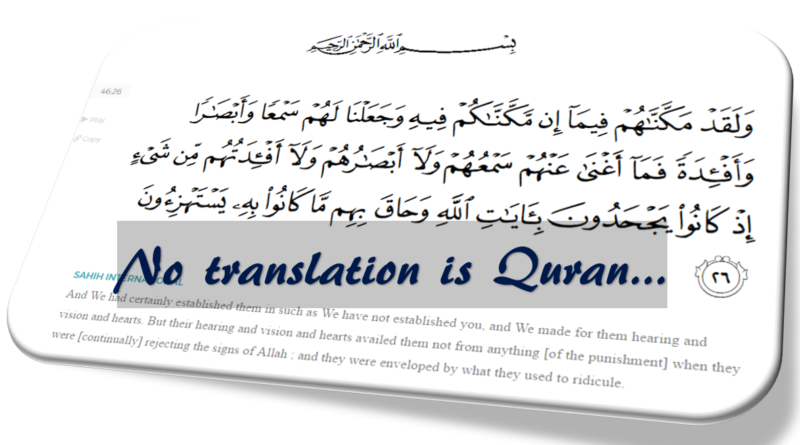Explanation for verse 26 in surah Al-Ahqaf
The ‘Aad of ancient Palmyra had abilities to weather-forecast
Quran 46:24-26
- Then, when they saw [the Penalty in the shape of] a cloud traversing the sky, coming to meet their vales, they said, “This cloud will give us rain!” “Nay, it is the [Calamity] you were asking to be hastened! – A wind wherein is a Grievous Penalty!
- “Everything will it destroy by the command of its Lord!” Then by the morning to follow- nothing was to be seen but [the ruins of] their houses! thus do We recompense those given to sin!
- And We had firmly established them in a [prosperity and] power which We have not given to you [ye Quraysh! Prophet Muhammad’s tribe 14 centuries ago] and We had endowed them with [ability to] perceive data (on weather) and ingenuity: but of no profit to them were their abilities to perceive data and ingenuity, when they went on rejecting the Signs of God; and they were [completely] encircled by that which they used to mock at!
Exegesis for the verse 46:26
The three Arabic words سَمْعًا (hearing), وَأَبْصَارًا (sight), وَأَفْئِدَةً(hearts) as traditionally interpreted occur in various contexts in Quran. The context in verse 46:26 alludes towards weather specific understanding- thus, I have interpreted it to mean the [ability to] perceive weather data as in a weather forecast. Engineering, examples of very ancient times surprise us, I have seen the work of stone architects to construct acoustic surfaces to transport sound. As found in Golkonda citadel and a fort the capital of medieval sultanate of the Qutub Shahi dynasty in Hyderabad c. 1518-1687.
Verse 26 clearly emphasizes that the Quraysh were not in the same footing as ‘Aad whom God had given skill and competence. If you rely on the traditional meanings, then you must concede even the tribes of Quraysh did perceive hearing and sight via their rudimentary organs; that would mean there would be no difference between the capabilities of ‘Aad people and the Quraysh, Prophet Muhammad’s tribe. Wherein precisely, Quran makes a categorical distinction.
If the Scientific community sees this as an opportunistic reading of the text on my part, then I must have to point out to their surprise that Prophet Solomon’s scientific panel per the Quran had abilities to teleportation. By their technological prowess per the Quran 27:40, one of his men could teleport the Throne of the Queen, from Sheba to his palace of a considerable distance away; in nearly the same time interval as that of a wink!
To be precise the context before the verse 26 is further evidence that these words do mean to refer to their abilities to perceive weather phenomenon. The verse 24 indicates the ‘Aad saw and perceived the clouds to give good rainfall but then God’s purpose to destroy was realised on them. Belittling, that their abilities to perceive had not helped them overcome the determinism of God. Further, the ‘Aad had worshipped an idol named Baalshamin deified for storms and fertilising rains; as they were stuck in their confirmation bias due to their worship of this god there is a good chance that they belittled God given abilities to perceive the severe weather instead to be a good rainfall by way of motivated reasoning in their worship to Baalshamin.
There is an undeniable evidence from the contexts of the Quran that the word وَأَفْئِدَةً translated as hearts is in fact, ingenuity due to its bearing the trilateral root that means to redeem. In my opinion the Quran translators at first leisure must make the necessary changes after deepening their contextual understandings of the Quranic text.
Subscribe with us to be first informed.
Click here to read on Series 3 The ‘Aad on lost civilizations: can you only blame Climate-change.

Pingback: can you only blame Climate-change